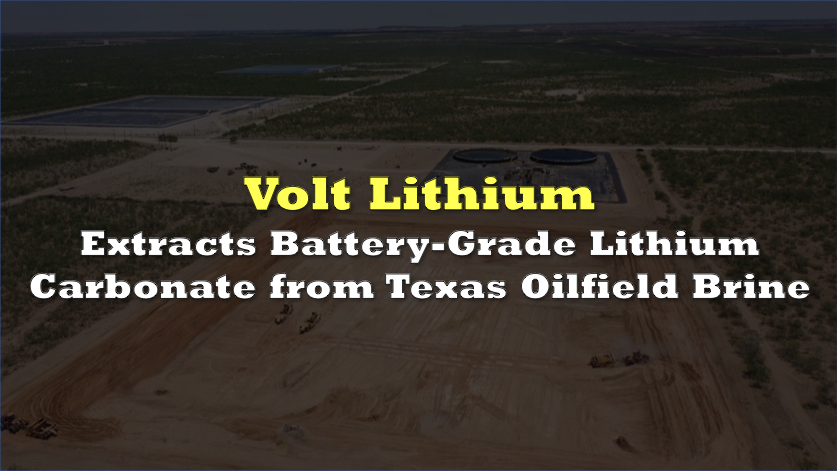Volt Lithium Corp. (TSXV: VLT) recently reported that it has successfully produced battery-grade lithium carbonate from oilfield brine in the Permian Basin, Texas. The Permian Basin, historically known for its oil and gas production, is now emerging as a new source of lithium.
The company’s direct lithium extraction (DLE) technology has allowed the company to extract and process lithium from the region’s oilfield brine, producing lithium carbonate with a purity level exceeding 99.5%. This product is vital for the production of lithium-ion batteries, which power electric vehicles (EVs) and energy storage systems.
“Successfully producing battery-grade lithium carbonate from the Permian is another significant milestone that Volt has achieved this year,” said Alex Wylie, President and CEO of Volt Lithium. “We are on track to become one of North America’s first commercial producers of lithium from oilfield brine, contributing to the security of future sources of critical minerals in North America.”
The successful production of high-purity lithium carbonate marks an important step for Volt as it eyes the commercialization of its DLE technology. This success aligns with broader efforts to reduce North America’s reliance on foreign lithium imports, especially from regions like China and South America, which dominate global production.
The DLE technology involves a three-stage process designed to extract lithium efficiently from oilfield brine. The process begins with purifying the brine to remove up to 99% of contaminants, followed by lithium extraction, which has shown a remarkable 99% success rate in producing a high-quality lithium chloride concentrate. This concentrate is then refined into battery-grade lithium carbonate.
The process has several advantages over traditional methods of lithium extraction, such as hard rock mining and evaporation ponds. First, it is faster, reducing the extraction process from months or years to days. Second, it is more environmentally friendly, as it uses existing oilfield brine rather than disturbing large amounts of land or consuming excessive water. Lastly, it provides a more reliable supply source by tapping into the vast reserves of brine associated with oil and gas fields in the U.S. and Canada.
The use of oilfield brine as a lithium source has important environmental implications. Traditional lithium extraction methods, such as mining and evaporation, have faced criticism for their environmental footprint, including water depletion and landscape disruption. In contrast, Volt’s method repurposes oilfield waste, offering a more sustainable approach to lithium production.
Additionally, this process could provide a new revenue stream for oil and gas companies. As the world transitions to cleaner energy, the ability to extract lithium from existing oilfield infrastructure could extend the economic life of these assets while supporting the energy transition.
Volt has been operating its DLE system in the field since mid-September 2024. During this time, the company has produced lithium chloride concentrate, a precursor to lithium carbonate, lithium hydroxide, and lithium metal, all of which are critical for battery manufacturing.
Samples of Volt’s lithium carbonate are currently being reviewed by potential offtake partners, signaling the start of commercial partnerships that could pave the way for large-scale production. If successful, Volt’s operations could help reduce the reliance on lithium imports, particularly from regions with geopolitical risks.
Volt Lithium last traded at $0.42 on the TSX Venture.
Information for this story was found via the sources and the companies mentioned. The author has no securities or affiliations related to the organizations discussed. Not a recommendation to buy or sell. Always do additional research and consult a professional before purchasing a security. The author holds no licenses.






